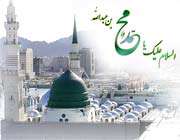In the name of God
LINEAGE
The oldest and noblest tribe in the whole of Arabia was Banu Hashim. They were the descendants of Ibrahim through his son Isma"il. The Arabs respected and loved them for their goodness, knowledge and bravery.
ABD AL-MUTTALIB
"Abd al-Muttalib was the chieftain of Banu Hashim and he was also the Guardian of the Ka"bah. Among his ten sons, "Abdullah was the father of the Holy Prophet.
Muhammad
In Mecca, baby boy Muhammad was born on 17th Rabi" al-Awwal, 570 AD.His father "Abdullah, son of "Abd al-Muttalib, died before he was born and when he was six, he lost his loving mother Aminah bint Wahab.His Grandfather, "Abd al-Muttalib, took the responsibility of bringing up the orphan. At the age of ten, he was berefted of his venerable grandfather.On his deathbed, he appointed his son Abu Talib as the guardian of Muhammad.Gentle, soft spoken, tall and handsome boy, Muhammad, accompanied the trading caravans of Abu Talib, across the deserts, giving him deep insight into nature and man.
Khadijah(A.S)
The wealthy noble widowed lady Khadijah, looking for a manager for her rich merchantile caravans, selects Muhammad, the Trustee. Able and fair dealing,Muhammad is a tremendous success. Khadijah already an admirer, made him an offer of marriage. Muhammad was twenty five and Khadijah forty. In spite of this disparity in age, the marriage proved to be a very happy one.
THE PROPHET
Lover of nature and quite worrried about human sufferings, Muhammad very often retired to Mount Hira" for meditations. One night, Laylat al-Qadr (the Night of Majesty) a voice addressing him, commanded "Recite in the name of thy Lord." Deeply excited by the strange phenomena of Divine Visitation,Muhammad hurried home to his wife, Khadijah, who listened to him attentively and said that "I bear witness that you are the Apostle of God." After an interval, the voice from heaven spoke again "O thou shrouded in thy mantle, arise, and warn, and magnify thy Lord."
This was a signal for him to start preaching the gospel of truth of One God. In the beginning Muhammad invited only those near him, to accept the new Faith. The first to embrace Islam among women was Khadijah and among men "Ali. Soon after, Zayd ibn al-Harithah became a convert to the new Faith.
For three long years, he laboured quietly to wean his people from the worship of idols and drew only thirty followers. Muhammad then decided to appeal publicly to the Quraysh to give up idol worship and embrace Islam.The new Faith, is simple without complications, practical and useful for everyday life. It commands to believe and do good, keep up prayer and pay the poorrate, two orders giving four principles of a successful way of life.Almost ten years of hard work and preaching, in spite of all persecution,produced over a hundred followers, physical cruelties and social boycott made life unbearable in Mecca. The Holy Prophet of Islam advised his followers, to seek refuge in the to seek refuge in the neighbouring country of Ethiopia. Eighty eight men and eighteen women sailed to the hospitable shores of the Negus, under the leadership of Ja"far at-Tayyar (brother of "Ali) and the cousin of the Holy Prophet.
several times the chieftains came to Abu Talib saying, "We respect your age and rank, but we have no further patience with your nephew. Stop him or we shall fight you." Abu Talib asked Muhammad for his decision.With tears in his eyes, the Apostle firmly replied, "O my uncle! If they place the sun on my right hand and the moon on my left, to force me to renounce my mission, I will not desist until God manifests His cause or I perish in the attempt."
TRAGEDIES
In a period of troubles, trials and tribulations two major tragedies afflicted Muhammad. First the venerable guardian uncle Abu Talib died and shortly afterwards his noble wife Khadijah died, leaving behind her daughter Fatimah (peace be on her) - the only child she had from the Holy Prophet - the daughter who looked after her father so much so that the prophet called her Umm Abiha (the mother of her father).
MUSLIM ERA
With the death of the old patriarch Abu Talib, the Meccans planned to assassinate the prophet. Under Divine guidance, he asked "Ali to sleep in his bed and Muhammad put his green garment on "Ali. While the murderes mistook "Ali for muhammad, the Holy Prophet of Islam escaped to Medina.
The Muslim era of Hijrah (Emigration) is named after this incident and dated from 17th Rabi" al-Awwwal, 622 AD.
From the time he came to Medina, he was the grandest figure upon whom the light of history has ever shone. We shall now see him as the King of men, the ruler of human hearts, chief law-giver and supreme judge.The Preacher who went without bread, was mightier than the mightiest sovereigns of the earth. No emperor with his tiaras was obeyed, as this man in a cloak of his own clothing.
He laid the foundation of the Muslim commonwealth and drew up a charter which has been acknowledged as the work of highest statemanship, a master-mind not only of his age, but of all ages.
Unlike the Arabs, the Prophet, had never wielded a weapon, but now he was forced to defend Islam by force of arms. Commencing from the battle of Badr,a series of eighty battles had to be fought, which the infant commmunity defended successfully.
UHUD
Next year, Abu Sufyan, the famous long-lived enemy of Islam, again attacked the Muslims at Uhud. Hamzah, the first flag-bearer of Islam and uncle of the Prophet, was killed in action. In spite of strict instructions from the Prophet, a few Muslim soldiers deserted their post,when victory was in sight. This changed the course of the battle. Khalid ibn al-Walid attacked the Prophet and the grave situation was saved by the timely arrival of "Ali. The enemies ran away and the issue was decided. Muhammad was deeply grieved at the death of Hamzah.
HUDAYBIYYAH
The Muslims had been in self exile for six years and began to feel a keen yearning for their homeland, Mecca. The Prophet desired to perform a pilgrimage to Ka"bah. When he forsook his home town he was weak, but when he wanted to return, he was strong. He did not use his strength to force an entry into the sacred city. Finding the Quraysh hostile, Muhammad entered into a treaty Known as the Peace of Hudaybiyyah, appearing not very advantageous to the Muslims, but which revealed the Islamic character of moderation and magnanimity. For the strong to excercise restraint and toleration is true courage. Having reached upto the door of their birth place with hearts over-flowing with impatient longing to enter it, the Muslims retraced their steps peacefully to Medina, under the terms of the treaty, which allowed them to perform the pilgrimage next year.
MECCA
In The 8th year AH, the idolators violated the peace of Hudaybiyyah by attacking the Muslims. The enemies were defeated and Mecca was conquered.The Prophet who fled from Mecca as a fugitive, now returned home as a mighty conqueror. The Rahmatun lil "Alamin (mercy unto all beings, i.e., the Prophet) entered the city with his head bowed low in thankfulness to the Almighty (Allah) and ordered a general amnesty, instead of the mass massacre of those who persecuted him and his followers
LAST PILGRIMAGE
Under the Divine intuition of his approaching end, Muhammad prepared to make the farewell pilgrimage to Mecca.Before completing all the ceremonies of Hajj, he addressed a huge multitude from the top of mount "Arafat on 8th Dhi al-hijjah, 11 AH,in words which shall ever ring and live in the atmosphere.
After finishing the hajj the Holy Prophet started for Medina. On his way, at Ghadir Khumm the Voice from Heaven cried: "O Apostle! deliver what has been revealed to you from your Lord; and if you do it not, then you have not delivered His message and Allah will protect you from the people, surely Allah will not guide the unbelieving people. (5:67) Muhammad immediately ordered Bilal to recall the Muslims, who had gone ahead,who were behind and who were proceeding to their homes at the junction, to assemble. The famous Sunni mutakallim and commentator, Fakhr ad-Din ar-Razi in his At-Tafsir al-Kabir, vol. 12, pp. 49-50, writes that the Prophet took "Ali by the hand and said: "Whoever whose mawla (master) I am, "Ali is his master. O Allah! Love him who loves "Ali, and be the enemy of the enemy of "Ali; help him who helps "Ali, and forsake him who forsakes "Ali."
DEATH
On Muhammad"s return to Medina, he got busy settling the organization of the provinces and the tribes which had adopted Islam. His strength rapidly failed and the poison (administered at Khaybar by a Jewess) took its deadly toll. So ended the life dedicated to the service of God and humanity from first to last, on 28th Safar, 11 AH.
The humble Preacher had risen to be the ruler of Arabia. The Prophet of Islam not only inspired reverence, but love owing to his humility,nobility, purity, austerity, refinement and devotion to duty.
The Master inspired all who came into contact with him. He shared his scanty food; he began his meals in the Name of Allah and finished them uttering thanks;he loved the poor and respected them; he would visit the sick and comfort the heart broken; he treated his bitterest enemies with clemency and forbearance,but the offenders against society were administered justice; his intellectual mind was remarkably progressive and he said that man could not exist without contant efforts.
There is no god but One God and Muhammad is the Apostle of God, peace and blessings of Allah be upon him and his descendants


No comments:
Post a Comment